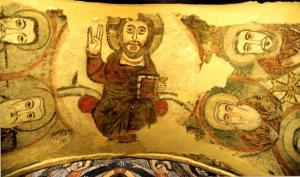
St. Antony the Great understood humility was vital for the Christian life, making it doubly important for those who would take on the religious life for themselves (that is, those who had a monastic profession). Asceticism is supposed to help us embrace self-denial, while pride, the opposite of humility, embraces the self and props it up. Even we do much which is good, even if we put into practice many particular virtues, they find themselves going astray if we do it all out of pride. For pride makes us so caught up in ourselves, we cannot act upon the greatest virtues, those of faith, hope and love. This is why, without humility, the ascetic will spiritually die, even as they might physically die if they try, out of vainglory, to assume too strict an ascetic lifestyle and do not take care of their own physical needs. Thus, St. Antony, writing with wisdom which applies to us all, said that we should look to the example of Jesus and follow after him and his humility if we want to experience the kingdom of God:
Truly, my children, I want you to know that there are many who have pursued asceticism throughout their life, but lack of discernment killed them. Truly, my children, I think it is no great wonder, if you neglect yourself and do not discern your works, that you should fall into the hands of the devil, when you think you are near to God, and that in your expectation of the light, darkness should overtake you. For what need was there at all for Jesus to gird Himself with a towel and wash the feet of His inferiors, but that He should make this an example, to teach those who should turn to Him their own first beginning? (Cf. John 13:4-17). For the beginning of their motion is the pride which came first. That is why, except through great humility in your whole heart and mind and spirit and soul and body, you will not be able to inherit the Kingdom of God.[1]
Humility turns us away from vainglory, from all pursuit of self-glorification. It is for this reason why it is legalism’s bane. Legalism promotes a false spirituality, telling us that we are good only if we follow the letter of the law; it does not understand the spirit or intent of the law, which is why those who are so legalistically bound do not understand when particular rules should not apply to a particular situation. The gifts of the Spirit lie in the spirit of the law and not its letter. Thus, Peter of Dios, a priest, believed it was more important to embrace the path of humility than to use his priestly authority to have the pride of place when he was worshiping with a group of people:
Peter, priest of Dios, when he prayed with others, ought to have stood in front, because he was a priest but because of his humility he stood behind saying, “This is what is written in the life of Saint Anthony.” He did this without annoying anyone.[2]
Peter of Dios was a true disciple of St. Antony the Great; though he had been made a priest, he took his ascetic discipline seriously. He knew St. Antony constantly indicated humility was a necessary component for a healthy spiritual life, indeed, that humility would indeed lead to his own salvation. For this reason, Peter embraced humility, and all that he did, he did with humility.
Peter was an ordained a priest. Many desert fathers avoided ordination, knowing the risks contained in becoming a priest, as those who became priests often lost their spiritual discipline and embraced worldly ways, including and especially, pride. To overcome such a temptation, when in prayer, Peter stood behind all others, lifting them up and treating them as his betters. In this fashion, he made sure his priestly ordination did not change him. Instead, it became another means by which he could lift others up, to serve them instead of being served by them. Peter did not annoy others because he did not consider his priesthood as a thing which made him special. Sadly, many clergy do not understand this; they like to use their ordination to spiritually abuse others, thinking that their ordination makes them special and others, who do not similarly possess such ordination, should therefore treat them with excessive reverence. Likewise, they think their authority now allows them to belittle others, and in this way, not only do they annoy the faithful, they scandalize them. If only they could learn what Peter had learned and understood their role should be as mediators working for the benefit of others instead of trying to make others look up to them and obey them without question. Ordination, to be sure, does bring much authority with it, but as with all spiritual charisms, that authority is weakened when it is mixed with pride. Wicked priests might still serve as ministers of the sacrament (for Donatism is certainly wrong in saying they cannot), but they do not have the moral authority to make decrees expecting everyone to obey their every whim without question.
When we put our faith into practice, we should do so with all humility. Thinking about our spiritual life as being one of rules and obligations, which if we fulfill, makes us great, only leads us astray. We do not understand the Christian faith if we act in this manner. Certainly, we should wish to be better, to be virtuous, indeed, to be holy, but this is not achieved merely through works of the law. We should, rather, seek the image and likeness of God within us, so that we can then become like God in the world, and do what is best in any circumstance we find ourselves in as if by natural instinct instead of by any external compulsion.
God is love, and so the image of God is the image of love. Love is kind and generous, it is not boastful or filled with pride, but it is humble and self-giving; if we do not understand this, then we will fail to understand the meaning and intention of the rules which the Christian faith suggests for us to follow. They are, like the Sabbath, to be used for us for sake. We were not made for them, they were made for us. We must discern the spirit behind them and engage them in and through that spirit, as Peter did in the way he prayed with others. He did not obey the strict letter of the law which would have expected him, whenever he prayed with others, to pray in front of them, leading them in their prayers because of his ordination. He went against legalistic expectations, but in doing so, he was able to fulfill the spirit of the law and lead the community as a priest by serving them and embracing them with his love. Let us follow his example, whether or not we are priests, and serve others with humility, so that instead of demanding the letter of the law and annoying others when the letter gets in the way of the spirit, we lift them with the spirit of the law. This way we can make sure that we truly come together, embrace one another in love. For it is only by such an embrace of love we can make our journey to our true home, that is, to the kingdom of God.
[1] St. Antony, The Letters of St. Antony the Great. Trans. Derwas J. Chitty (Fairacres, Oxford: SLG Press, 1991), 23 [Letter VI].
[2] The Sayings of the Desert Fathers. trans. Benedicta Ward (Kalamazoo, MI: Cistercian Publications, 1984), 207 [Saying of Peter of Dios].
Stay in touch! Like A Little Bit of Nothing on Facebook.
If you liked what you read, please consider sharing it with your friends and family!













